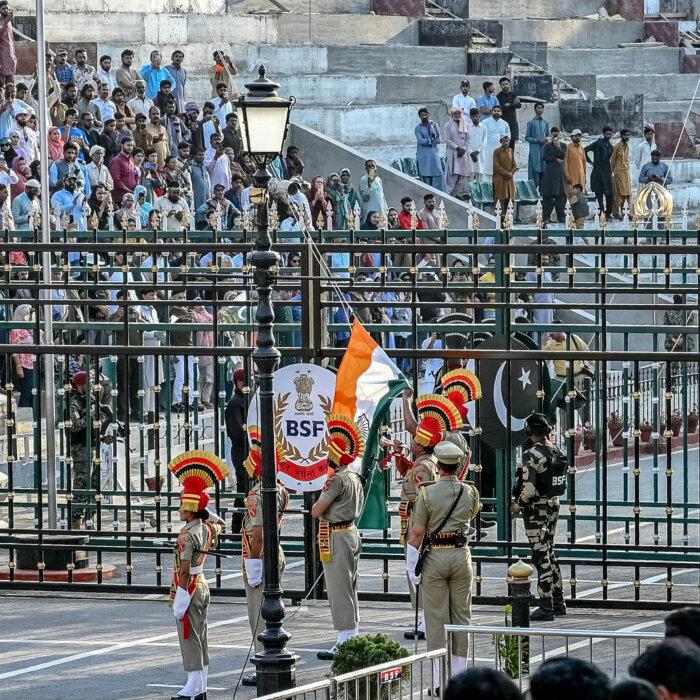Pakistan says it reserves the right to respond “in self-defense, at a time, place, and manner of its choosing,” after India launched air strikes against several targets in Pakistan and Pakistani-administered Kashmir killing 26 people.
‘Imaginary Terrorist Camps’
But Pakistan’s National Security Committee, chaired by Pakistani Prime Minister Shehbaz Sharif, said in a statement that the Indian air strikes were carried out “on the false pretext of the presence of imaginary terrorist camps.”It claimed that civilian infrastructure, including mosques, had been deliberately targeted.
“These unprovoked and unjustified attacks martyred innocent men, women and children,” it said.
The committee said Pakistan’s armed forces had been authorized to take “corresponding actions” in response to what it said was a violation of its sovereignty.
Pakistan’s military spokesman, Lt. Gen. Ahmed Sharif, said Indian missiles had hit six locations in Pakistan-administered Kashmir and in the east of Pakistan’s Punjab province, killing at least 26 people, including women and children.
Later, Pakistan said five people had also been killed in Pakistani-administered Kashmir following artillery exchanges.
India claimed that at least seven civilians had been killed in the district of Poonch after Pakistan fired artillery across the Line of Control into Indian-administered Kashmir.
Earlier, India said nine sites had been targeted by the air strikes, but it insisted that its “actions have been focused, measured and non-escalatory in nature.”
“No Pakistani military facilities have been targeted. India has demonstrated considerable restraint in selection of targets and method of execution,” it said in a statement.
Claims Indian Planes Shot Down
Sharif said Pakistan’s air force had shot down five Indian jets in retaliation.India has so far not confirmed the loss of any aircraft. The Epoch Times was unable to verify Pakistan’s claims.
Reports and photographs have emerged of aircraft wreckage near three villages in India-administered Kashmir.
Both countries are nuclear powers, and the prospect of a full-scale war in the region has led to concern from world leaders.
Stéphane Dujarric, a spokesman for U.N. Secretary-General Antonio Guterres, said he was very concerned.
China Urges ‘Restraint’
Chinese Foreign Ministry spokesman Lin Jian said: “China opposes all forms of terrorism and calls on both India and Pakistan to prioritize peace and stability, remain calm and exercise restraint, and avoid actions that could further complicate the situation.“We are willing to work with the international community to continue playing a constructive role in easing the current tensions.”
Indian Prime Minister Narendra Modi has postponed an official trip he was due to make during the week beginning May 12 to Norway, Croatia, and the Netherlands amid the tension with Pakistan.
Pakistani Prime Minister Shehbaz Sharif said in a statement: “Pakistan has every right to give a robust response to this act of war imposed by India, and a strong response is indeed being given.
“We will never let the enemy succeed in its nefarious objectives.”
Pakistan has denied any connection to the April 22 attack by gunmen, for which an unknown group called the Kashmir Resistance, also known as The Resistance Front, has claimed responsibility.
India has suggested that the group is an offshoot of Lashkar-e-Taiba, a terrorist group that has in the past attacked the Indian military and police in Indian-administered Kashmir.
Operation Named in Honor of Widows
The Indian army said the military operation was named Sindoor—a Hindi word for the red vermilion powder worn by married Hindu women on their forehead and hair—in recognition of the women whose husbands were killed in front of them during the April 22 attack.The Indian Ministry of Defence said in its statement about Operation Sindoor: “These steps come in the wake of the barbaric Pahalgam terrorist attack in which 25 Indians and one Nepali citizen were murdered. We are living up to the commitment that those responsible for this attack will be held accountable.”

On May 7, some airlines rerouted or canceled flights that would have passed through the conflict airspace.
Salman Khan, a businessman who was on an Emirates flight from Dubai to Lahore in Pakistan on the night of May 6, told The Epoch Times: “Around 12:30 a.m., more than halfway into the flight, the captain announced that Lahore had closed its airspace due to a security situation and the flight will need to turn to Karachi or back to Dubai.
“So he turned the plane around and we flew back to Dubai. Soon, we all realized why that happened.”







